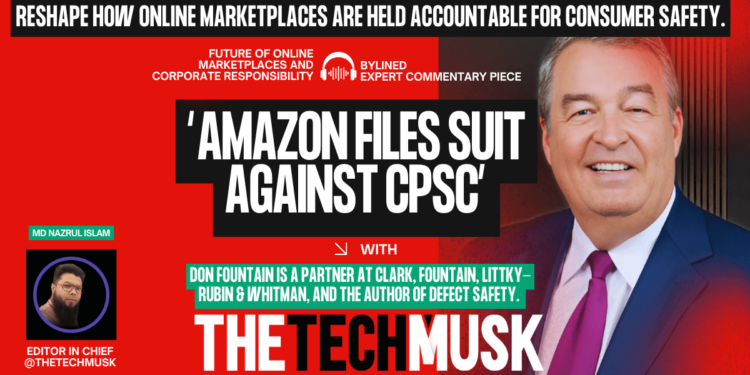The empire strikes back—against the Consumer Product Safety Commission (the federal agency responsible for protecting consumers from unsafe products) and five of its commissioners.
Jeff Bezos was clearly dissatisfied with losing the years-long legal battle against the Consumer Product Safety Commission and now intends to overturn that decision in federal court.
On March 14, 2025, Amazon filed a federal lawsuit in the District Court of Maryland against the Consumer Product Safety Commission, and five of its commissioners individually seeking to reverse and set aside the ruling that made Amazon legally responsible for complying with the Consumer Product Safety Act regarding dangerous products. The ruling specifically classified Amazon as a ‘distributor,’ meaning Amazon actively manages and sells products, directly implicating it in consumer safety compliance.
The new Amazon suit seeks to erase this ruling and takes aim at the agency’s determination that Amazon is a “distributor“ under the law, and as a result is responsible for complying with the Consumer Product Safety Act concerning defective products. The suit also takes direct aim at the five commissioners of the agency who dared to advance and create this determination.
Amazon again contends that it is only a “third-party logistics provider” not unlike the United States, Postal Service, FedEx, or UPS, and as such has no obligations to comply with the Consumer Product Safety Act. Amazon emphasizes the word ‘solely,’ insisting its role is limited strictly to storing and transporting products—despite clear evidence it goes far beyond basic logistics.
Prior to filing the lawsuit, Amazon sought and was granted permission to stay the effective date of the Consumer Product Safety Commission “distributor” ruling until the conclusion of the current lawsuit.
Amazon’s complaint admits it directly sells products as a manufacturer and retailer, making it subject to Consumer Product Safety Commission oversight in those instances. However, for third-party products sold on its platform, Amazon insists it is merely a ‘third-party logistics provider’ with no direct safety obligations—even though it extensively advertises these products, interacts directly with customers, and manages returns and refunds.
Amazon claims it fits within the definition of a third-party logistic provider, which is “a person who solely receives, holds, or otherwise transports a consumer product in the ordinary course of business, but who does not take title to the product.”
Amazon strategically glosses over—or ignores—the critical word ‘solely.’ It must downplay this because it openly acknowledges handling advertisements, setting rules, monitoring product descriptions, managing customer support, processing payments, and handling refunds—all clearly beyond basic logistics.
This very issue was already litigated between Amazon and the Commission in administrative court — and resolved squarely in favor of finding Amazon to be a legal distributor, not a third-party logistics provider.
The Consumer Product Safety Commission considered all these same arguments at length before issuing its final ruling, ultimately concluding: “This is not a close case. Amazon does considerably more than is allowed by the definition of third-party logistics provider.”
So, what about FedEx, UPS, DHL, Old Dominion, Werner Enterprises, SAIA Inc.?
What about these companies? Well, for starters, this isn’t even a close call. These companies don’t have online platforms where they promote, sell, and service products — and they don’t do any of the things Amazon does.
Although the primary legal issue in Amazon’s new lawsuit is whether it qualifies as a “distributor” or a “third-party logistics provider,” there’s a secondary — and perhaps more sinister — undertone. A backup plan of sorts.
The complaint also names the five commissioners of the Consumer Product Safety Commission as defendants: Peter A. Feldman, Mary T. Boyle, Douglas Dziak, Alexander Hoehn-Saric, and Richard L. Trumka Jr. Why? In a not-so-veiled hint of what may already be underway — or soon to come — the complaint spends considerable time arguing that the President of the United States should have the power to fire CPSC commissioners at will, despite existing law that limits removal to “neglect of duty or malfeasance in office, but for no other cause.”
It seems pretty clear Amazon is advocating for the president to be able to fire commissioners for any reason — including having the gall to issue a ruling Amazon doesn’t like.
Well, Amazon admits the Consumer Product Safety Commission — established in 1974 as an independent agency — “undoubtedly has an important role to play with respect to product safety.” But Amazon claims the Commission overstepped by classifying it as a “distributor,” and whatever important role it plays, it shouldn’t be playing it with Amazon.
CPSC commissioners are appointed by the president to seven-year terms. The five currently named as defendants — a mix of Democrats and Republicans — were all appointed by President Biden. That fact alone makes them prime Trump targets, consumer safety implications aside.
To support its argument that the president should be able to fire commissioners at will, Amazon cites a February 12, 2025, letter written by Sarah Harris, the newly appointed Solicitor General under President Trump. In that letter to Congress, Harris argues the law preventing the president from removing CPSC commissioners “except for neglect of duty or malfeasance in office” is unconstitutional — and urges the Supreme Court to strike it down. Why is the Solicitor General, just weeks into the job, so interested in this law? And who asked her to write the letter?
Ironically, the very law Amazon now seeks to undo was designed to keep politics out of product safety.
The complaint argues that the commissioners “overstepped their statutory limits,” “stretched the Consumer Product Safety Act beyond the breaking point,” and failed to meet their obligations under the Administrative Procedure Act.
Amazon claims it “is suffering and will continue to suffer irreparable harm” from being subjected to an order issued by what it calls an unconstitutionally structured agency. The lawsuit asks the court to set aside the CPSC’s order defining Amazon as a distributor — and thus subjecting it to the Consumer Product Safety Act.
But within the prayer for relief lies something more troubling. Amazon asks the court to strike down the law that prevents politically motivated firings of CPSC commissioners, effectively granting the President the power to remove them at will. That, of course, would pave the way for appointing new commissioners — ones who might be more inclined to reverse the Amazon ruling.
The complaint lays out six counts, five of which allege violations of the Administrative Procedure Act. Amazon also claims the Commission’s ruling infringes on its First and Fifth Amendment rights — free speech and due process under the U.S. Constitution.
Amazon claims the ruling violates the separation of powers built into the U.S. government. More specifically, it argues the Commission’s decision was “arbitrary, capricious, an abuse of discretion, and not in accordance with law,” and that it violates Amazon’s First and Fifth Amendment rights.
The most alarming count is Count Five: Violation of the Constitutional Separation of Powers, Unconstitutional for Cause Removal Protections for Commissioners of the Consumer Product Safety Commission. A close reading of this section makes it clear — this is a message to President Trump: fire the commissioners.
Amazon is asking the court to deem unconstitutional the law that permits their removal only for “neglect of duty or malfeasance in office, but for no other cause.” Why? To legitimize the firing of commissioners who dared to take on Amazon.
To support its claim that it is a third-party logistics provider, Amazon cites court decisions from 2018 and 2019 — in product defect cases — that found it was not a distributor. However, all of those rulings predate the extensive litigation conducted by the Consumer Product Safety Commission.
Whether those same courts, presented now with the evidence uncovered by the Commission, would reach the same conclusion remains an open question.
About Don Fountain
Don Fountain has secured over a billion dollars in verdicts and settlements over his 37-year career. His work protecting consumers has led to major safety improvements in vehicles, boats, tires, and everyday products. Double board certified by the Florida Bar and National Board of Trial Advocates, he is a founding partner at Clark, Fountain, Littky-Rubin & Whitman in West Palm Beach, Florida.



























